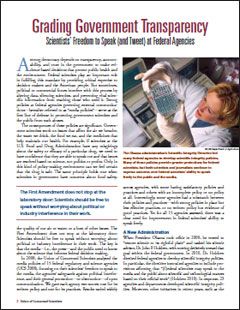See the 2015 updated version of Grading Government Transparency.
A strong democracy depends on transparency, accountability, and trust in the government to make evidence-based decisions that protect public health and the environment. Federal scientists play an important role in fulfilling this mandate by providing critical expertise to decision makers and the American people.
But sometimes, political or commercial forces interfere with this process, preventing scientific information from reaching those who need it. Strong policies governing external communications serve as the first line of defense against such abuses.
Our 2013 report, Grading Government Transparency, looks at the policies governing scientists' communications through both traditional and social media at 17 federal agencies, evaluating the policies in a variety of categories and summarizing each evaluation with a letter grade.
Changes in the landscape
The report revisits the subject of a similar 2008 UCS analysis, Freedom to Speak? A Report Card on Federal Agency Media Policies. The 2008 version found a wide range of policies and practices, but overall, a clear need for improvement in federal scientists' ability to speak freely.
The incoming Obama administration took some positive steps on scientific integrity and transparency, and a 2011 survey of journalists by the Columbia Journalism Review and ProPublica found that these actions had made a difference, with the respondents grading the administration higher on transparency and access to information than the previous one. However, many respondents also reported continuing problems, suggesting that there is still much progress to be made.
The media landscape has also changed since 2008; the role of social media has expanded enormously, creating a need for policies to address concerns specific to these rapidly growing channels. Some agencies have developed social media policies, and Grading Government Transparency evaluates these as well.
How we graded agency policies
The report gives each agency two letter grades: one for media policy and the other for social media policy. The media policy scoring rubric is based on six measures of open communication, assessing how well each policy:
- Is accessible, current, clear and consistent;
- Protects scientific free speech;
- Safeguards against abuse;
- Is consistent with legal requirements;
- Promotes openness and timeliness;
- Includes handling of misconduct and disputes.
The social media policy rubric applies these principles in the social media context, and also considers two additional measures: correction of errors in technical information and consideration of risks.
Detailed breakdowns of the scoring rubrics can be found in the report.
What we found
Many agencies' media policies have improved significantly since 2008. Notably, a majority of agencies have enhanced their policies by including a few key additions:
Personal-views exception—the right of scientists to express personal views not authorized by the agency, as long as they make clear that they are not speaking for the agency and do not use unreasonable amounts of government time and resources in the process.
Whistleblower provisions—protections from retaliation for employees who speak out about fraud, waste, or abuse in government, including scientists who expose censorship of information that is crucial to public health and safety or required by law or regulation.
Dispute resolution process—a procedure to resolve disagreements between scientists and non-scientists regarding the release of scientific information.
On the other hand, most agency policies still lack other important provisions, including:
Right of last review—the right of scientists to review, prior to publication, the final drafts of any communications that are being released under their name or that substantially rely on their research.
Access to drafts and revisions—the right of scientists to have access to drafts and revisions of written materials to which their research significantly contributed.
Media policy solutions
Despite improvements, serious concerns remain, and much needs to be done. The report recommends the following specific steps that the administration, federal agencies, Congress and journalists can take to foster free and open communication between federal scientists and the public:
- All federal agency media policies should include personal-views and right-of-last-review provisions as described above.
- Agencies should incorporate into their media policies acknowledgment of the protections afforded by the Whistleblower Protection Enhancement Act of 2012.
- All federal agencies should develop a social media policy that includes a personal-views exception and a distinction between personal and official use of social media tools.
- Agencies should focus on effective implementation of their media and social media policies, ensuring that they are visible and employees are given relevant training on them.
In addition, others can play a role in helping agencies develop and effectively implement media and social media policies:
- The Office of Science and Technology Policy should assess agency progress and speak forcefully on the need for strong and effective media and social media policies.
- Congress should hold agency heads accountable for encouraging the free flow of scientific information to the public.
- The president should make strong and effective agency policies on media and social media a priority to ensure that transparency is part of his legacy.
- Journalists should call out those agencies that block the free flow of information to the public.






